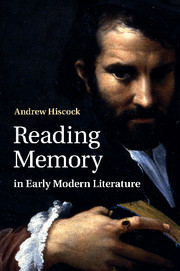Book contents
- Frontmatter
- Contents
- Figures
- Acknowledgements
- Introduction: ‘the dark backward and abysm of time’
- Chapter 1 ‘To seke the place where I my self hadd lost’: acts of memory in the poetry of Henry Howard, Earl of Surrey
- Chapter 2 ‘Remembre not (lorde) myne offences’: Katherine Parr and the politics of recollection
- Chapter 3 ‘Better a few things well pondered, than to trouble the memory with too much’: troubling memory and martyr in Foxe’s Acts and Monuments
- Chapter 4 Text, recollection and Elizabethan Fiction: Nashe, Deloney, Gascoigne
- Chapter 5 The Doleful Clorinda? Mary Sidney, Countess of Pembroke, and the vocation of memory
- Chapter 6 ‘Tell me where all past yeares are’: John Donne and the obligations of memory
- Chapter 7 ‘Of all the powers of the mind … the most delicate and fraile’: the poetry of Ben Jonson and the renewal of memory
- Chapter 8 ‘This art of memory’: Francis Bacon, memory and the discourses of power
- Notes
- Select Bibliography
- Index
Chapter 1 - ‘To seke the place where I my self hadd lost’: acts of memory in the poetry of Henry Howard, Earl of Surrey
Published online by Cambridge University Press: 05 April 2014
- Frontmatter
- Contents
- Figures
- Acknowledgements
- Introduction: ‘the dark backward and abysm of time’
- Chapter 1 ‘To seke the place where I my self hadd lost’: acts of memory in the poetry of Henry Howard, Earl of Surrey
- Chapter 2 ‘Remembre not (lorde) myne offences’: Katherine Parr and the politics of recollection
- Chapter 3 ‘Better a few things well pondered, than to trouble the memory with too much’: troubling memory and martyr in Foxe’s Acts and Monuments
- Chapter 4 Text, recollection and Elizabethan Fiction: Nashe, Deloney, Gascoigne
- Chapter 5 The Doleful Clorinda? Mary Sidney, Countess of Pembroke, and the vocation of memory
- Chapter 6 ‘Tell me where all past yeares are’: John Donne and the obligations of memory
- Chapter 7 ‘Of all the powers of the mind … the most delicate and fraile’: the poetry of Ben Jonson and the renewal of memory
- Chapter 8 ‘This art of memory’: Francis Bacon, memory and the discourses of power
- Notes
- Select Bibliography
- Index
Summary
There is nothing in man of all the potential parts of his mind (reason and will except) more noble or more necessary to the actiue life then memory: because it maketh most to a sound iudgement and perfect worldly wisedome, examining and comparing the times past with the present, and by them both considering the time to come, concludeth with a stedfast resolution, what is the best course to be taken in all his actions and aduices in this world: it came vpon this reson, experience to be so highly commended in all consultations of importance, and preferred before any learning or science, and yet experience is no more than a masse of memories assembled, that is, such trials as man hath made in time before.
George Puttenham, The Arte of English Poesie (1589), i.xixIn his Arte of English Poesie (1589) George Puttenham left his reader in no doubt of the privileged status he wished to attribute to the resources of memory. From this perspective, the faculty enabled the human mind to engage with personal and collective histories of origination and belonging, to assimilate the fruits of others’ epistemological enquiries and to legitimise (through recourse to precedent) given paths of cultural interaction. In developing such arguments, Puttenham was following in the steps of generations of humanist scholars. Indeed, earlier in the century, during the reign of Henry VIII, Juan Luis Vives had stressed in De Tradendis Disciplinis (Antwerp, 1531) that the erudition of the ideal teacher should be ‘ample, accurate, diligent, [and] careful’ and that ‘His memory for words and things must be good and rich, and he must keep it sound by carefulness and constant devotion to learning’.
This chapter focuses upon some of the ways in which the promptings of memory, as articulated in Surrey’s poetry, may be perceived as belonging to a much larger matrix of cultural concerns with legacies of the past and the paradigms they might establish for present courses of action during what Greg Walker has persuasively described as ‘the gathering crisis of Henry’s latter years’. Assuming a host of different guises, the acts of memory evoked by Surrey can offer a complex lens through which both poetic voice and reader are invited to reflect upon the ideological pressures at work in Henrician England. Surrey refrains from soothing or reassuring his readers with beguiling appeals for nostalgia: he is most often found to deploy highly selective acts of memory as a tactical resource for cultural critique. Indeed, his poetry expresses an inexhaustible fascination with controlling our access to the past, with the production of the past, and nowhere is this more apparent than in his poetic anatomies of political and erotic desire.
- Type
- Chapter
- Information
- Reading Memory in Early Modern Literature , pp. 37 - 64Publisher: Cambridge University PressPrint publication year: 2011



